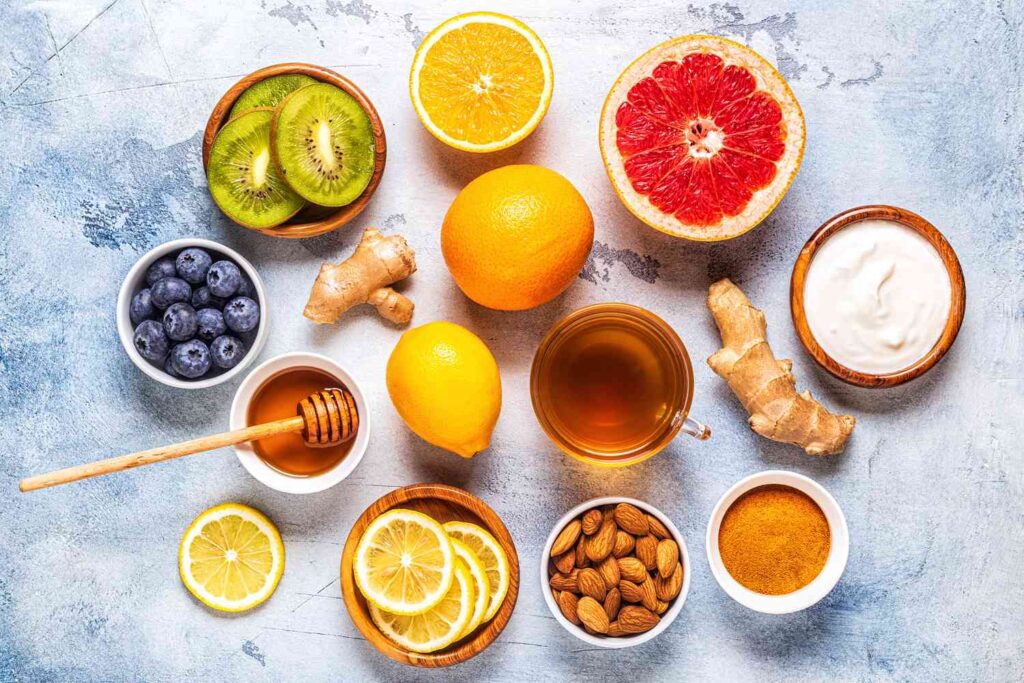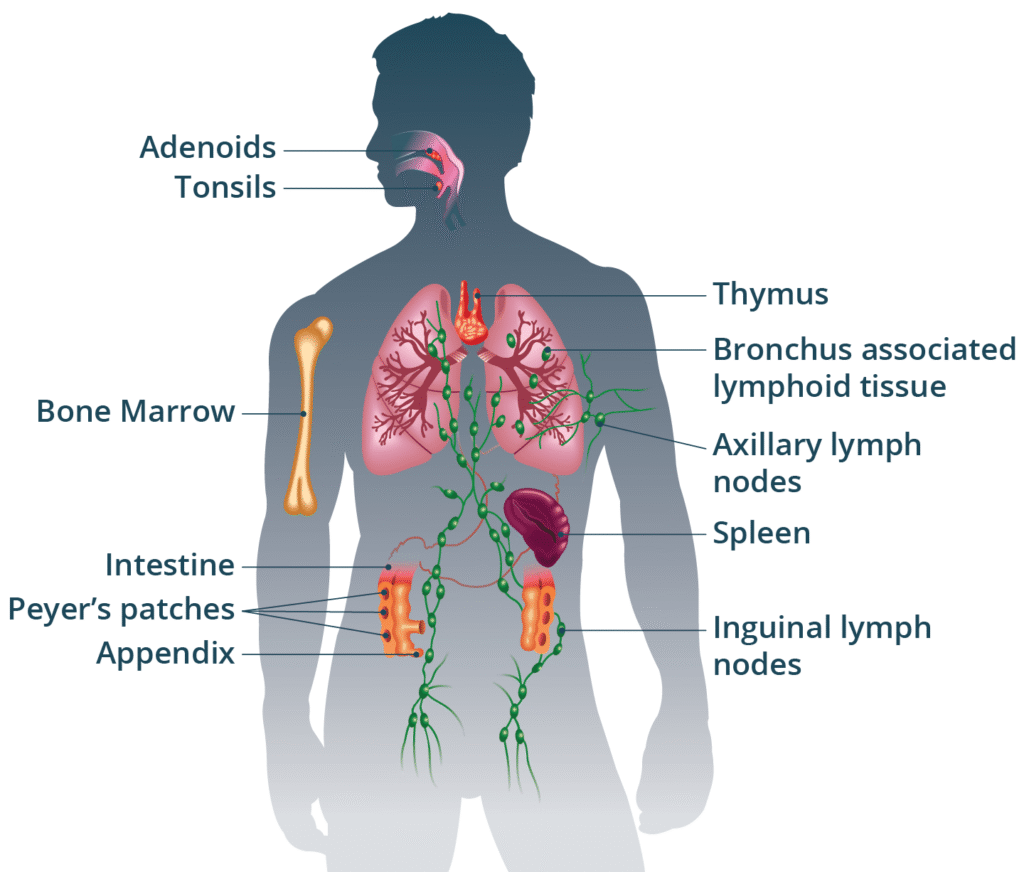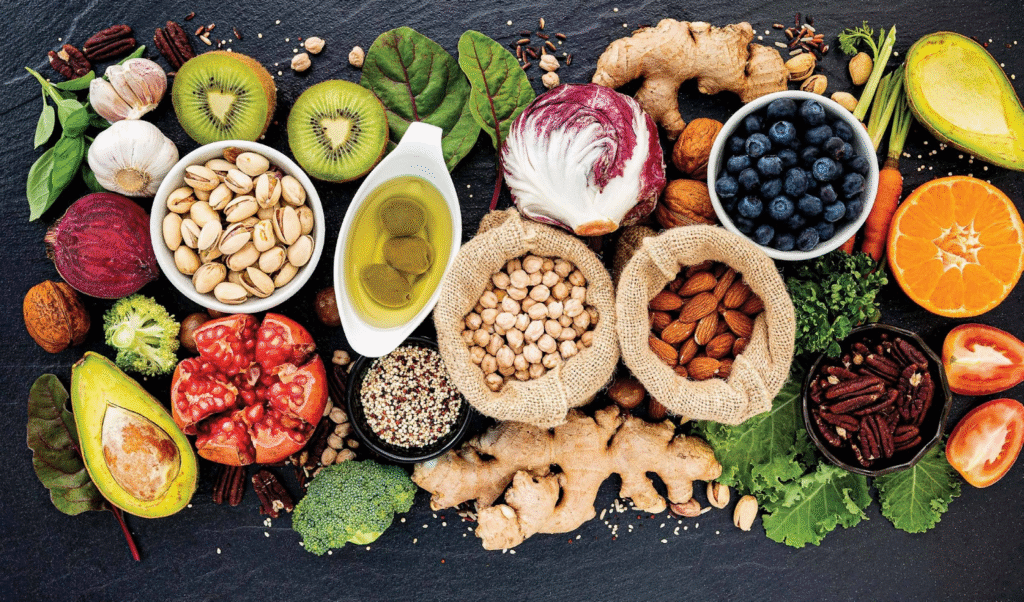
A strong immune system depends on a balanced diet rich in nutrients, antioxidants, and gut-friendly foods. Eating fruits, vegetables, whole grains, nuts, and fermented foods strengthens immune cells, improves gut balance, and protects against illness naturally.
Key Takeaways
- Vitamin C, D, E, zinc, and selenium are core nutrients for immune strength.
- Probiotic and prebiotic foods like yogurt, kefir, garlic, and oats support gut-immunity link.
- Antioxidant-rich foods such as berries, green tea, and nuts protect immune cells from damage.
- Variety in diet ensures broad nutrient coverage for optimal immune defense.
- Processed foods, sugars, and excess alcohol weaken immune response.
- Whole foods work better than supplements for lasting immunity and faster recovery.
Understanding the Immune System
The immune system is a complex network made up of cells, tissues, and organs. It works like your body’s security system, detecting and dealing with threats before they cause harm. When your immune system is strong, you are less likely to fall ill or take longer to recover.

Key facts to know about your immune system include:
- There are two main parts of the immune system: innate (the body’s first line of defense) and adaptive (which remembers and targets specific threats).
- Immune cells include white blood cells, antibodies, and other special cells.
- If you often feel tired, get frequent infections, or heal slowly, your immune system might need more support.
- The right nutrition is more effective than relying only on supplements.
Probiotic and Prebiotic Foods for Immunity

Your gut is home to trillions of bacteria, many of which help regulate your immune system. The healthier your gut, the stronger your immunity. Probiotic and prebiotic foods work together to create a healthy gut environment.
- Probiotics are live bacteria that add to the good bacteria in your gut.
- Prebiotics are fibers that feed the good bacteria already living there.
Best Probiotic Foods
Including these foods regularly in your diet can help improve your immune function.
- Yogurt with live cultures: Adds good bacteria to the gut, boosting immune health.
- Kefir: Fermented drink with extra probiotics that support digestion and immunity.
- Kimchi and sauerkraut: Fermented vegetables rich in probiotics and antioxidants for gut and immune health.
- Miso and tempeh: Fermented soy foods that help balance gut bacteria and support immunity.
- Pickles (fermented in brine): Provide natural probiotics for a healthier gut and stronger immune system.
Best Prebiotic Foods
Including these foods regularly in your diet can help improve your immune function. These foods create a healthier gut, which helps your immune system work more effectively.
- Garlic: Contains natural fibers that feed good gut bacteria and support immunity.
- Onions: Rich in prebiotics that help grow healthy bacteria in the gut.
- Bananas: Provide fiber that encourages good bacteria and helps digestion.
- Asparagus: Offers prebiotic fiber that boosts gut health and immune strength.
- Oats: Packed with beta-glucan fiber, supporting healthy gut bacteria and overall immunity.
Antioxidant-Rich Foods for Immune Support
Antioxidants are natural compounds that protect your body from damage caused by harmful molecules called free radicals. A diet high in antioxidants helps keep your immune cells healthy and able to respond to threats.
Including a variety of these foods can make a real difference:
- Berries such as blueberries, strawberries, and raspberries are loaded with antioxidants.
- Dark chocolate in moderation can provide flavonoids that protect immune cells.
- Green tea offers polyphenols, which have powerful antioxidant effects.
- Nuts like almonds and walnuts are rich in vitamin E and healthy fats.
Natural Foods to Boost Immunity: Evidence-Based List

Including these foods in your diet gives your body key vitamins, minerals, and natural compounds it needs to fight illness, recover faster, and stay healthy.
Citrus Fruits
Citrus fruits like oranges, grapefruits, lemons, and limes are widely recommended for immune health because they are among the richest sources of vitamin C. Vitamin C is essential for immune cell function, especially white blood cells that protect you from infection. Regularly eating citrus can help your body create more of these cells and make them more effective at fighting off viruses and bacteria.
Vitamin C is also an antioxidant. This means it helps protect cells from damage caused by free radicals that build up when your body is fighting infection. Studies show that people who get enough vitamin C have fewer and shorter colds. Because your body cannot store vitamin C, it’s important to eat some every day.
Best way to include: Eat citrus fruits fresh, add slices to water, or use the juice in dressings and marinades.
Red Bell Peppers
Red bell peppers are one of the best-kept secrets for immune health. They contain even more vitamin C per serving than most citrus fruits, making them a powerhouse for boosting immunity. They are also high in beta-carotene, a plant pigment that your body converts into vitamin A.
Vitamin A is important for keeping the lining of your nose, throat, and lungs healthy, these act as barriers against germs. The combination of vitamin C and beta-carotene means red bell peppers help both the inside and outside parts of your immune defense.
Best way to include: Eat them raw in salads, slice as a crunchy snack, or lightly sauté to preserve their nutrients.
Broccoli
Broccoli is packed with nutrients known to support the immune system, including vitamins A, C, and E, plus fiber and many antioxidants. These nutrients help immune cells function properly and also support the health of your gut, where much of your immune system operates.
Broccoli’s antioxidants help prevent inflammation and cell damage during infection. Lightly steaming is the best way to keep its nutrients available.
Best way to include: Steam or stir-fry and add to salads, pasta, or as a side dish.
Garlic
Garlic is famous in natural medicine for its ability to help fight infections. Its most important compound is allicin, which forms when you crush or chop garlic. Allicin may boost the response of some types of white blood cells and help your body fight colds and other minor illnesses.
Studies suggest people who eat garlic regularly have fewer colds and recover faster. Garlic also has mild anti-inflammatory and antiviral properties.
Best way to include: Add fresh, chopped garlic to sauces, soups, stir-fries, and dressings. For the most benefit, let chopped garlic sit for a few minutes before cooking.
Ginger
Ginger is well-known for easing sore throats and reducing inflammation. Its active compounds, such as gingerol, have antioxidant effects that help immune cells work better and may reduce the risk of infections. Ginger can also help with nausea and is often used as a natural remedy for colds or flu.
Best way to include: Grate into tea, smoothies, soups, or Asian-style dishes.
Spinach
Spinach is loaded with vitamin C, beta-carotene, and antioxidants. These work together to boost the infection-fighting ability of your immune system. Spinach also contains iron and folate, two nutrients important for creating new immune cells. Lightly cooking spinach (just until it wilts) helps your body absorb more of its vitamins.
Best way to include: Add to salads, sandwiches, eggs, or soups. Lightly steam or stir into hot dishes.
Almonds
Almonds are an excellent source of vitamin E, a fat-soluble vitamin that helps keep immune cells working and protects their outer membranes. Vitamin E is also an antioxidant that fights inflammation and cell damage.
Just a small handful (about 23 almonds) gives you nearly half your daily vitamin E needs, plus healthy fats that help your body absorb other vitamins.
Best way to include: Eat as a snack, sprinkle over salads or yogurt, or blend into nut butter.
Turmeric
Turmeric contains curcumin, which is strongly anti-inflammatory and may help turn on parts of your immune response. Curcumin also increases the activity of white blood cells and can help the body fight off viruses. Curcumin is best absorbed with black pepper, which helps your body use more of it.
Best way to include: Add turmeric and black pepper to curries, soups, or rice. Mix into smoothies or lattes for a warming drink.
Yogurt
Yogurt with live and active cultures (probiotics) is important for gut health, which is closely linked to immune function. These good bacteria help balance your gut’s ecosystem and “train” your immune system to respond better to infections.
Eating yogurt regularly may lower your chances of catching colds and can reduce the length and severity of infections.
Best way to include: Choose plain, unsweetened yogurt. Top with fruit, honey, or nuts. Look for “live and active cultures” on the label.
Sunflower Seeds
Sunflower seeds are rich in vitamin E, selenium, and healthy fats. These nutrients act as antioxidants, supporting immune cell growth and protecting against cell damage. Selenium also plays a role in lowering inflammation and boosting antibody production.A small handful of sunflower seeds can meet much of your daily vitamin E needs.
Best way to include: Sprinkle on salads, yogurt, oatmeal, or eat as a snack.
Green Tea
Green tea is packed with antioxidants called catechins, which have strong effects on immune health. Green tea also contains the amino acid L-theanine, which may help your body produce better-fighting immune cells. Regular green tea drinkers tend to have stronger overall health and may recover more quickly from common infections.
Best way to include: Drink hot or iced. Add lemon or honey for flavor and extra vitamin C.
Poultry
Chicken and turkey are both high in vitamin B6. This vitamin is essential for making new, healthy red and white blood cells. Poultry also provides protein, which your body needs to repair and build immune cells.
Chicken soup, especially, can help clear nasal congestion and may have mild anti-inflammatory effects that help you recover from colds.
Best way to include: Bake, grill, or use in soups and stews. Add vegetables for extra immune support.
Shellfish
Oysters, crab, mussels, and other shellfish are some of the best food sources of zinc. Zinc is crucial for normal development and function of immune cells. It also helps your body produce and activate T-cells, which attack infected cells.
A zinc deficiency can weaken immune function and make you more likely to get sick.
Best way to include: Eat cooked shellfish as part of meals. Avoid raw shellfish to prevent foodborne illness.
Mushrooms
Shiitake, maitake, and reishi mushrooms contain unique compounds called beta-glucans, which stimulate parts of the immune system. These mushrooms also offer B vitamins, selenium, and antioxidants that support immune health.
Studies show that eating mushrooms regularly can help strengthen immune defenses and may reduce inflammation.
Best way to include: Slice into soups, stir-fries, salads, or roast with vegetables.
Berries
Berries like blueberries, strawberries, and elderberries are loaded with vitamin C and antioxidants. These help your immune cells communicate and protect them from damage. Elderberry, in particular, is known for reducing how long cold and flu symptoms last.
Berries also offer fiber, which supports gut health, another key part of immunity.
Best way to include: Add to yogurt, cereal, smoothies, or eat fresh as a snack.
Dark Chocolate
Dark chocolate, in moderation, can be a powerful immune booster thanks to its antioxidants, especially flavonoids. These help protect your immune cells from damage and support overall health.
Look for chocolate with at least 70 percent cocoa for the highest benefits, and eat small amounts to avoid excess sugar.
Best way to include: Eat a small piece after meals, or add cocoa powder to smoothies or oatmeal.
Sweet Potatoes
Sweet potatoes are a rich source of beta-carotene, which the body turns into vitamin A. Vitamin A is essential for healthy skin and mucous membranes, which are your body’s first defense against bacteria and viruses.
Beta-carotene also acts as an antioxidant, helping immune cells function better and protecting them from damage.
Best way to include: Roast, mash, or bake as fries. Pair with olive oil to help absorb the beta-carotene.
Why Variety Matters
Eating a mix of these foods every week ensures you get a wide range of vitamins, minerals, and other compounds that work together to keep your immune system strong. The more colors and types of foods you include, the better your chance of covering all your nutritional bases.
This evidence-based approach helps you build lasting protection and resilience against sickness starting right at your next meal.
Immune Boosting Meal Planning and Recipes
Eating for immunity is not just about adding one or two superfoods. The key is building meals that combine many of these powerful ingredients. Simple recipes and meal plans can make a big difference.
Sample Daily Meal Plan
Here are some practical ways to include these foods every day:
- Breakfast: Greek yogurt with berries, sunflower seeds, and a drizzle of honey
- Lunch: Spinach salad with grilled chicken, red bell peppers, almonds, and a citrus vinaigrette
- Snack: Sliced oranges and a handful of walnuts
- Dinner: Salmon or tofu with broccoli, sweet potatoes, and a garlic-ginger stir-fry
- Beverage: Green tea or ginger lemon tea.
Foods and Habits That Weaken Immunity
Some foods and lifestyle choices can make your immune system less effective. It’s important to know what to avoid so you can stay healthier in the long run.
- Processed Foods: Foods high in refined sugar, salt, and unhealthy fats can suppress your immune response.
- Added Sugars: High sugar intake may increase inflammation and lower your body’s defense against infections.
- Excess Alcohol: Drinking too much can lower immune cell numbers and make it harder to fight off illness.
- Chronic Dieting or Overeating: Both can disrupt immune balance and reduce your ability to recover from sickness.
- Poor Food Safety: Eating undercooked or contaminated foods can expose you to bacteria that challenge your immune system.
Science and Myths: Debunking Popular Immunity Food Claims
There are many claims about “superfoods” or miracle cures, but not all are supported by science. Understanding what really works will help you focus on what matters.
- Superfoods Don’t Work Alone: No single food will prevent illness. A varied diet is always more effective.
- Supplements Are Not Always Needed: If you eat a balanced diet, you may not need extra vitamins or minerals. Too much of certain nutrients can even harm your health.
- Fact vs. Fiction: Foods like garlic, elderberry, or ginger can support your immune health, but they are not cures for disease. Use them as part of a balanced diet.
- Myth: Citrus Fruits Prevent Colds: While vitamin C is essential for immune health, citrus fruits do not prevent colds in healthy people they may only slightly shorten the duration of symptoms.
- Myth: Garlic Can Kill Viruses: Garlic has antimicrobial properties in lab studies, but there’s no strong clinical evidence that it prevents infections in humans.
- Myth: Ginger Boosts Immunity Directly: Ginger reduces inflammation and supports general health, but it does not directly “strengthen” the immune system against infections.
- Myth: Yogurt or Probiotics Prevent Illness: Probiotics help gut health, which indirectly affects immunity, but their effect on preventing colds or infections is limited and strain-specific.
- Myth: Elderberry Syrup Stops Viral Infections: Elderberry may slightly shorten cold duration, but it cannot replace vaccines or medical treatment.
- Myth: Supplements Can Replace a Healthy Diet: Vitamins and herbal supplements cannot substitute for a balanced diet. Overdosing on certain vitamins can even be harmful.
- Myth: More Vitamins = Stronger Immunity: Excess intake of fat-soluble vitamins (A, D, E, K) can be toxic, and extra vitamins do not automatically enhance immunity.
Conclusion
A healthy immune system depends on a balanced diet rich in vitamins, minerals, and natural compounds. Eating a variety of foods like citrus fruits, red bell peppers, garlic, spinach, berries, and yogurt helps supply nutrients that support immune cells and gut health. Probiotic and prebiotic foods strengthen the gut, while antioxidant-rich foods protect cells from damage.
Processed foods, excess sugar, and alcohol can weaken immunity. No single food is a cure, but a diet built on fresh, whole foods gives your body the best defense. Regular healthy meals, not supplements alone, keep your immunity strong and resilient.
FAQs
1. What are the top foods scientifically proven to boost immunity?
The top foods include citrus fruits, red bell peppers, garlic, ginger, spinach, yogurt, almonds, mushrooms, and shellfish. Each of these is backed by research for supporting immune health.
2. How much vitamin C do I need for a healthy immune system?
Most adults need around 65 to 90 mg of vitamin C per day. You can get this easily from a serving of citrus fruit or red bell pepper.
3. Can certain foods really prevent you from getting sick?
No food can guarantee you will not get sick. But a diet rich in fruits, vegetables, and other immune-supporting foods can lower your risk and help you recover faster.
4. Which foods should I avoid to maintain strong immunity?
Avoid processed foods, high added sugars, and excess alcohol. These can weaken your immune response.
5. Do probiotics help boost immune function?
Yes, probiotics found in yogurt, kefir, and fermented foods support a healthy gut, which is closely tied to immune health.
6. Are supplements as effective as whole foods for immunity?
Whole foods are usually better because they provide a range of nutrients that work together. Supplements can help if you have a deficiency, but too much can be harmful.
7. What immune-boosting foods are best for kids and elderly?
Both groups benefit from fruits, vegetables, whole grains, eggs, dairy, fish, and legumes. Older adults may need more vitamin D and B12.
8. How quickly can changing your diet improve your immune health?
Some improvements can be seen in a few days, but building a strong immune system is a long-term process.
9. Are there foods that can help manage autoimmune conditions?
A balanced diet with anti-inflammatory foods like fatty fish, leafy greens, and berries can help manage inflammation. Always consult your doctor for personalized advice.
10. Does eating more garlic or ginger prevent colds and flu?
Garlic and ginger have properties that support immune health, but they do not prevent illness on their own. Use them as part of a varied diet for the best results.
Reference
- Medical News Today. (2018). Foods that boost immunity. https://www.medicalnewstoday.com/articles/322412
- MrMed. (2023). Top 10 ways to improve immune system. https://www.mrmed.in/health-library/health-care/top-10-ways-to-improve-immune-system
- Healthline. (2023). Foods that boost the immune system. https://www.healthline.com/health/food-nutrition/foods-that-boost-the-immune-system
- Riverside Medical Clinic. (2023). 10 ways to boost your immune system. https://www.riversidemedicalclinic.com/10-ways-to-boost-your-immune-system/
- National Center for Biotechnology Information. (2023). Immune function and nutrition. https://pmc.ncbi.nlm.nih.gov/articles/PMC10143734/
- Stamford Health. (2023). How to boost your immune system naturally. https://www.stamfordhealth.org/healthflash-blog/infectious-disease/how-to-boost-immune-system-naturally/
- Brown Health. (2023). Foods that boost your immune system. https://www.brownhealth.org/be-well/foods-boost-your-immune-system
- CareCredit. (2023). How to boost your immune system. https://www.carecredit.com/well-u/health-wellness/how-to-boost-your-immune-system/
- Houston Methodist. (2020). 5 ways to boost your immune system. https://www.houstonmethodist.org/blog/articles/2020/mar/5-ways-to-boost-your-immune-system/
Chance Jones is a clinical biochemist with a PhD in Clinical Biochemistry from the University of Toronto (2014) and 11 years in assay development and reference-range validation. Their expertise spans nutrient biomarkers (e.g., 25(OH)D, B12, ferritin) and lab quality standards (CLIA/CAP). Chance audits evidence behind test-guided supplementation and explains lab variability for readers. Profiles: ORCID, ResearchGate; selected publications and method validations.

